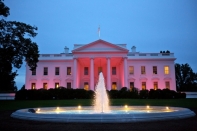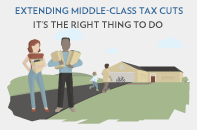Blog Action Day: “The Power of We”
Following last year’s contribution for Blog Action Day (that addressed the devastating crises in the Horn of Africa), we have returned to focus on a more domestic issue and reflect on moments over the past year when everyday Americans joined together to demonstrate the “power of we.”
The White House is constantly looking to expand public engagement and public involvement, making government both accessible and responsive to the needs of its citizens. Three examples stand out among many others.
In December of 2011, and again in February of 2012, the American people took to the Internet to tell Washington in no uncertain terms that letting the payroll tax cut expire was not acceptable. If Congress let the payroll tax cut expire, a typical family of four earning $50,000 a year would see about $40 less in each paycheck. For many middle class families struggling to recover from the worst recession since the Great Depression, losing $40 a week would have meant a lot. Tens of thousands of Americans spoke out to share their simple but powerful stories about what losing $40 per paycheck would mean for them and their families.
Thanks to their voices, middle-class Americans scored a major victory when Congress took action and President Obama was able to sign this extension into law.
When I first heard the topic for Blog Action Day, I immediately thought of a video called “Why Your Voice Matters” that features some of the people who believed that their voice could make a difference and had the courage to speak out:
Or check out a slideshow featuring 50 Americans across 50 states who, through the Power of We, helped ensure that taxes didn’t go up on 160 million of their fellow citizens.
Interest rates on Federal subsidized Stafford loans were set to go up on July 1st, 2012, a change that would have saddled more than 7 million students with an average of $1,000 each in additional debt President Obama challenged students to speak up and take to their campuses and the internet saying “Don’t Double my Rate:”
But I’m asking everyone else who’s watching or following online -- call your member of Congress. Email them. Write on their Facebook page. Tweet them -- we’ve got a hashtag. Here’s the hashtag for you to tweet them: #dontdoublemyrate. All right? I’m going to repeat that -- the hashtag is #dontdoublemyrate. Your voice matters. Stand up. Be heard. Be counted. Tell them now is not the time to double the interest rate on your student loans.
Thousands of student accepted his challenge, calling on elected officials and taking to Facebook and Twitter with the hashtag #DontDoubleMyRate, and they made their message heard and Congress acted, passing a bill to stop rates from going up.
In September 2011, the White House launched a new online tool last year called We the People to offer a simple and public way to petition the Obama Administration to take action a range of issues. If a petition gathers 25,000 signatures, policy officials review it and provide an official response. If Americans harness the “Power of We,” the White House will respond. In just one short year, the White House has received more than three million signatures from the public on over fifty thousand petitions.
Throughout American history, the right to petition government has always been an integral part in our ability to interact with and change government. Today, the right to petition continues to illustrate “the Power of We,” and how the collective public can influence change in our government. We the People empowers the American people to participate in the traditional petition process our Founding Fathers sought to protect through a 21st century medium.
We take petitions seriously. Petitions posted on We the People have a real impact on policy-making. The popularity of two petitions concerning online piracy (a.k.a. SOPA & PIPA) crystallized the Administration’s position on the issue, which was first detailed in a response on We the People. In response to a petition demanding stronger oversight of commercial breeders who sell puppies online, the U.S. Department of Agriculture announced they were developing a proposed rule that would cover internet breeders under the Animal Welfare Act. Once the rule was open for public comment, petition signers were invited to weigh in.
Whether you want to lend your voice to a petition or start your own, check out We the People. Every petition and signature keeps the “Power of We” strong in our government.

















